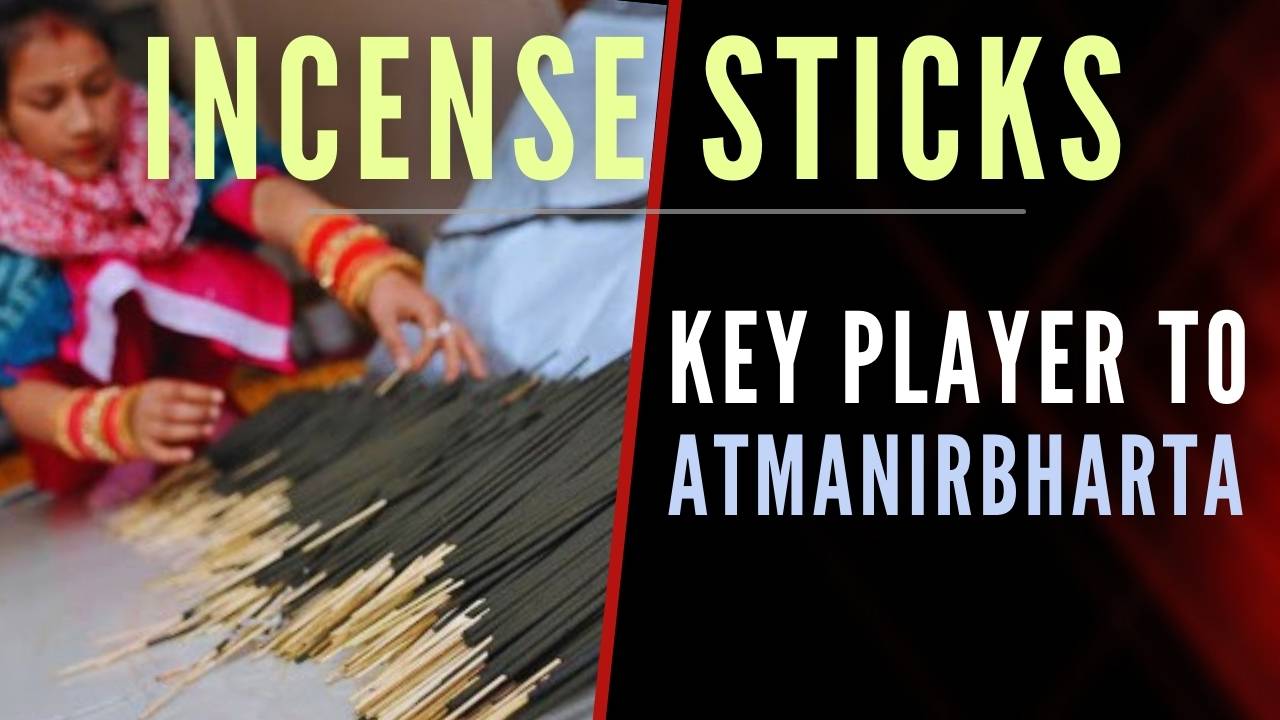Hike from 10% to 25% in import duties on Incense sticks
In early 2021, the Ministry of MSME (Micro, Small and Medium Enterprises) & KVIC (Khadi Village Industries Commission) announced that import duties on Incense sticks have been hiked from 10% to25%, it was widely hailed by everyone as a boost to the indigenous incense sticks industry and Bamboo industry. Let us examine why it was said like that using the basics of economics along with examining the other loopholes that this industry faces and let’s try to find some solutions.
Incense sticks or agarbattis as they are commonly called are very well known for their religious purposes but seldom is mentioned about the economic and strategic benefits that it has to provide for India. Incense sticks are not only used for religious purposes. It is also used for aromatic purposes, meditation and also as an insect repellent.
Indian incense sticks industry has a great demand within the nation given the population demographics of India.
According to a recent research paper published in Research.net named Incense sticks market and their impact on the economy[1]. It was mentioned that the incense sticks industry has the potential to grow in India. It was a well-researched paper in which the benefits and the particulars of the incense sticks industry were mentioned. The research paper mentioned 3 points or facts which were: THE problems faced by this industry, opportunities and the type of people employed in the incense sticks industry.
The incense sticks industry is a cottage industry where women are primarily employed. Incense sticks require bamboo as their primary component apart from other important materials like perfume ingredients. The incense sticks industry provides employment to at least 20,000 people and there are about 500 companies producing incense sticks in India. Incense sticks are exported from India to about 95 nations some of which are the USA, Argentina etc. India’s exports of indigenously manufactured incense sticks were close to 400 Cr in 2017 which is only 10% of the entire exports of incense sticks of the world. This industry primarily has a great benefit because of the availability of cheap labour in India, the availability of raw materials and the skill that is required to make incense sticks are available in India. According to many reports, 4,000 incense sticks can be made by 1 person in a day[2].
Indian incense sticks industry has a great demand within the nation given the population demographics of India. But the import of incense sticks has risen from 31 Cr INR in 2009 to 546 Cr INR in 2020, which means the import quantity has risen by approximately 15 times in the last 10 years. A statement given by KVIC pointed out that of 1490 tons of consumption every day in India of incense sticks only 760 tons is made in India. It also said that the main exporter of incense sticks in India is China or the People’s Republic of China and Vietnam which is a member of ASEAN. Hence raising import duties on incense sticks would lead to the prices of incense sticks to rise which would reduce their demand in India since the law of demand is applied here. There would be a higher consumption of incense sticks produced in India which would lead to greater production of incense sticks of Indian industries producing them. This is a smart decision but there are a few other problems that need to be addressed.
Even KVIC has agreed through multiple press releases in the Press Information Bureau that there is a huge gap between demand and supply which is making Indian consumers look for alternatives in Chinese and Vietnamese products.
In the production process, domestic competition is very important for small scale industries to survive. Without competition, they won’t be able to up their skill due to which the market can become very weak over a period of time.
There is a need to double the production of the incense sticks industry in order to make cottage industries a major force for the economic development of India also given that majority of workers are women hence, there is also a large scope for women empowerment.
In Aug 2020, the Ministry of MSME launched a scheme called Khadi Agarbatti Yojana in which 25% subsidy would be provided by KVIC during the production process apart from providing up-skilling services ., this would reduce the total cost of production which would lead to private investment rise and growth of employment and GDP of the nation as it is government expenditure. Given that there are only 500 companies producing incense sticks, a lot of burdens and the demand-supply ratio will not be balanced unless more companies are opened up.
When there are more companies in a particular industry then there is a scope for more improvement as domestic competition would rise and production would also rise. For more companies to come up there are 2 ways: When new technology is discovered during the production process and when finances are easily met/ managed. Hence the top 10 scientific institutions and technological institutions should be asked to develop new technologies within a time frame. This would lead to many new companies eyeing this industry as a potential where production is easily met and more can be produced. This would lead to lots of private investment where a lot of employment generation will take place and since women are the main members of this industry there would be financial independence and this would lead to a lot of socio-cultural benefits for India. The best example when technological improvements led to the expansion of an industry is the banking sector where the introduction of computers led to more banking facilities being opened up in India.
Financial management can prove to be tricky and more companies/ individuals should be aware of the latest loan requirements, registration required for cottage industries etc. The existing industries must be asked to form SHG and cooperatives so that obtaining loans, production/ day can rise as many would come together to produce incense sticks or else due to financial management problems the existing companies would close down which is not in benefit for India and this industry
In the production process, domestic competition is very important for small scale industries to survive. Without competition, they won’t be able to up their skill due to which the market can become very weak over a period of time. In December 2020 Government of India launched Toycathon which was meant to facilitate competition between toymakers of India hence, the Government of India can launch a similar domestic competition platform for the incense sticks industry because when such platforms are provided then the producers can also learn from experiences of others, the techniques that they employ in marketing etc., which would lead to good quality products being produced and they would be able to capture the entire domestic market and gain reputation in the international market. This one step would lead to more interpersonal connect which is important for an economy.
An article published in the Economic times reported how bamboo production is impacting the incense sticks industry[3]. In a press release, it was said by KVIC that though being the second-largest producer of bamboo India is the second-largest importer of bamboo & its products. The National Bamboo Authority should be requested to hand over the excess bamboo procured /produced to local incense sticks producing units at a reasonable rate beneficial to producers. This would lead to higher and easier availability of raw material which would actually help one of India’s oldest industry to produce more apart from generating a good amount of revenue for the National Bamboo Authority which could then be invested into different schemes and since it is government expenditure so applying Keynesian economics it would lead to higher GDP growth and more employment.
The incense sticks industry can become an important player for strategic and national security concerns. The export duties on the incense sticks to select nations of strategic importance where there is a lot of demand should be reduced to a reasonable extent so that some part of the produce is even exported, this would lead to 4 positive effects:
- Rise in exports since demand has risen in the select nation. This would strengthen India’s forex reserves even more which have reached $400 billion this month.
- Entry of Indian goods into these markets from where more revenue can be generated and eventually Indian goods and industry gaining more profit in these nations which would invite foreign & private investment since it is a profitable business more will invest.
- Close cooperation between India and other nations.
- Development of a holistic marketing network.
From the article, it is clear that the Indian incense industry is 1 of the keys to achieving Atmanirbharta in cottage industries which would lead to the fulfilment of PM Narendra Modi’s vision of aspirational districts and also a strong economy would be created. But this won’t be successful until the educated and common people contribute actively to nation-building. The policies should be reframed, revisited and renovated from time to time.
Note:
1. Text in Blue points to additional data on the topic.
2. The views expressed here are those of the author and do not necessarily represent or reflect the views of PGurus.
References:
[1] The Current Scenario of Indian Incense Sticks Market and Their Impact on the Indian Economy – ResearchGate
[2] ‘Toiling day and night, I make Rs 1,000 per week’: Plight of Bengaluru’s agarbatti makers – Sep 25, 2019, The News Minute
[3] Enhanced import duty to give a big boost to agarbatti and bamboo industries in India: KVIC – Jun 11, 2020, ET
- Incense sticks: Key player to Atmanirbhar Cottage Industries - June 20, 2021












Getting ready for the Third Phase of Covid.
Incense smoke and smell to drive out/ kill Covid.
Enough stocks to repel will be at hand.
Good piece of information & statistics
[…] To Read More, Please Visit Source […]